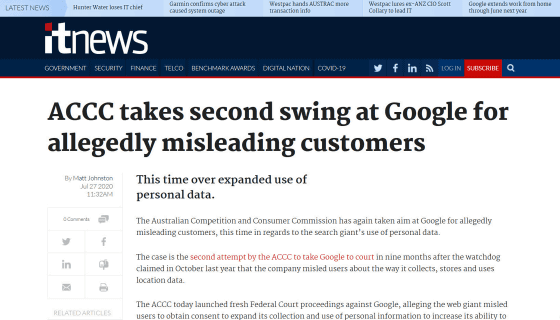'Google notified users in a deliberately misleading way to collect their personal information,' a national agency filed

Google collects your personal information in a variety of ways to help you display ads, improve our services, and more. The Australian
We've launched Federal Court proceedings against Google, alleging they misled Australian consumers to obtain consent to expand the scope of info they could collect and combine about consumers' internet activity, for their use, including for targeted ads. https://t. co/yFl9nJix0j pic.twitter.com/NhUrs8PZiW
— ACCC (@acccgovau) July 27, 2020
Correction: ACCC alleges Google misled consumers about expanded use of personal data | ACCC
https://www.accc.gov.au/media-release/correction-accc-alleges-google-misled-consumers-about-expanded-use-of-personal-data-0
Australia sues Google over data collection practices that merged DoubleClick data to create single user profiles • The Register
https://www.theregister.com/2020/07/27/australia_sues_google/
ACCC takes second swing at Google for allegedly misleading customers-Cloud-Software-Storage-iTnews
https://www.itnews.com.au/news/accc-takes-second-swing-at-google-for-allegedly-misleading-customers-550880

ACCC Chair Rod Sims explained why he filed a lawsuit against Google: 'We did this because of how Google handles your personal information, including activities on websites that are unrelated to Google. I think Google misleads Australian consumers about that.'
It was a well-known fact that Google collects personal information, but ACCC integrates user information that Google collects on its website etc. and personal information obtained through
The privacy policy also states that 'Integrating double-click cookie information and personally identifiable information will not be done unless the user opts in.' It does not diminish your right to do so without your express consent.'

Since June 2016, Google has sent pop-ups to users saying 'What's new in their Google account.' This pop-up says, 'We have introduced some optional features in your account that give you more control over the data we collect and how it is used, while at the same time making Google more relevant ads. You will be able to display.” and asked the user for consent to change.
However, at the same time, Google changed the user policy of 'Do not combine double click information and Google information unless there is opt-in'. The new policy changes: 'In order to improve our services and the ads we serve, your activity on other websites and apps may be associated with your personal information, depending on your account settings.' Was being done.
By changing this privacy policy, if the user clicks 'I agree' about the popup notification, the activity on websites and applications other than Google can be integrated with information such as Google account. The ACCC alleges that Google deliberately fooled the user for profit, saying that the privacy policy changes and the unsolicited approach to consent were misleading.

by Robert Scoble
'Google has significantly expanded the range of information it collects in a personally identifiable way, including some very subtle and private information made on third-party websites,' said Sims. And Google used this information to serve targeted ads without the explicit consent of the user.'
On the other hand, Google admitted to the ACCC complaint that it updated the advertising system and related user controls in June 2016, but claimed that the notification to the user was easy to understand. He said he strongly opposes the ACCC's claim that the information would not be integrated if the users did not agree.
In Australia, there are active moves to tighten regulations on various technology companies, and in October 2019, the ACCC sued Google in connection with the collection of location information . Also, in April 2020, it was reported that the Australian government ordered the ACCC to create ``a rule to distribute revenue from news content by digital platforms such as Google and Facebook to the existing media that created the content''. It is being done.
Government moves to create rules to distribute revenue earned by Google and Facebook from news collection and distribution to existing media-GIGAZINE

Related Posts:
in Web Service, Posted by log1h_ik






